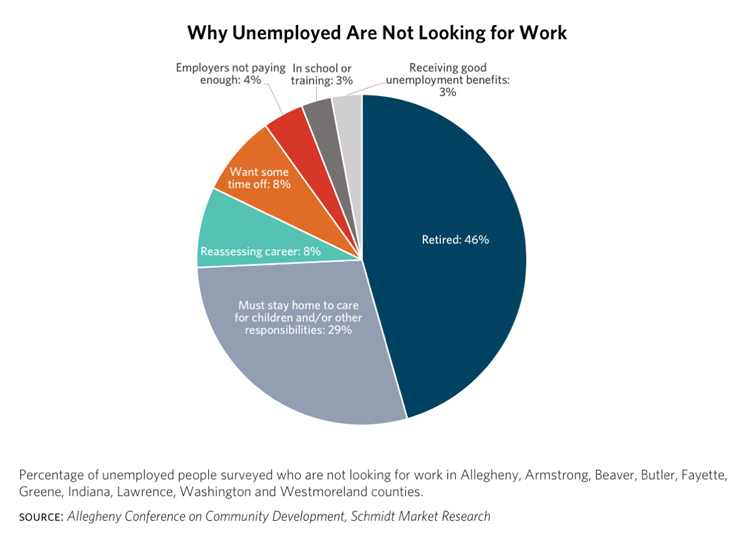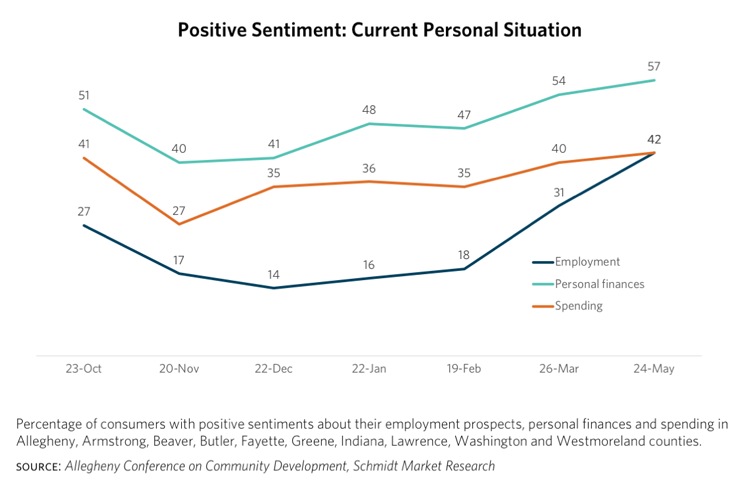Pandemic’s Disruptive Path Still Haunts the Unemployed

Fallout from the pandemic is discouraging a significant number of unemployed southwestern Pennsylvanians from looking for work, even as businesses reopen and COVID cases decline, according to a recent survey.
Caring for children, dependent older adults and others was the most common reason for not looking for work that was given by unemployed workers who are not retired.
Residents of 10 southwestern Pennsylvania counties are surveyed monthly by the Allegheny Conference on Community Development and Schmidt Market Research to gauge consumer confidence, personal finance and other issues during the pandemic.
The latest survey, done in May, sheds some light on a pandemic phenomenon: Although jobs are steadily returning and the unemployment rate is shrinking, the region’s workforce is struggling to add workers to fill the hole left when the COVID pandemic forced tens of thousands out of a job.

“We hear from businesses that they have a hard time filling jobs,” said Vera Krekanova, chief strategy and research officer at the Allegheny Conference. “Early in the year, businesses were saying they were having a hard time filling highly skilled positions. In April and May, we started to see they were having a hard time filling jobs across skill levels and across the wage spectrum.”
Last month, 14 percent of residents surveyed reported that they were unemployed, but not looking for work at that time. Of those, 46 percent were retired and not looking to get back into the workforce.
For the rest, the survey suggests that the year-long disruption of in-person instruction in schools, and care for children and seniors continue to affect their ability to return to work. Some 29 percent of unemployed workers not looking for work said they’ve put off hunting for a job because caring for children or other responsibilities require them to stay home.
“Most of the people said they couldn’t go back to work because the infrastructure around them isn’t fully functional yet or they don’t feel safe about them,” Krekanova said.
Another 8 percent say they aren’t looking for work because they are reassessing their careers.
The survey offers scant evidence supporting the concern that more generous pandemic unemployment benefits are discouraging laid off workers from returning to the workforce. Only 3 percent of unemployed workers cited that as the reason for not seeking work.
Disruption of care-giving supports that many rely on may also contribute to the overall preference of southwestern Pennsylvanians for working remotely. Only 42 percent of those surveyed prefer to return to working in person with others in offices and other settings. “Women and millennials said they strongly prefer remote,” Krekanova said. “It is not because they are less social or they don’t want to interact. I think they carry most of the care-giving responsibilities.”
Confidence boost
Confidence in the regional economy has risen sharply this year. In May, 40 percent of consumers felt confident in the regional economy, up from only 11 percent in April. Confidence in personal finances and the consumer spending also continued to rise.

One of the largest boosts in confidence is seen in how people assess their employment prospects. For much of the pandemic, confidence in their own job situation was low, even as the region’s unemployment rate improved. In January, only 14 felt confident in their job prospects.
By May, however, 42 percent of people in the region felt good about their employment situation. “It is important to see that confidence is up,” Krekanova said. “The flip side is that we still have a majority of people who don’t feel optimistic. We are not there yet, but we are seeing progress.”





